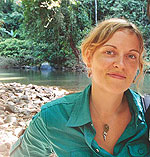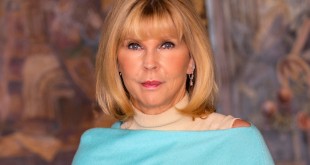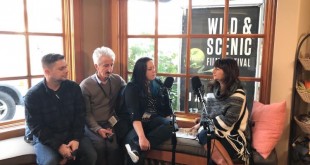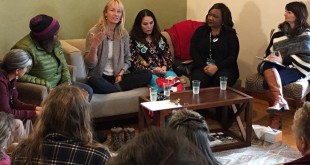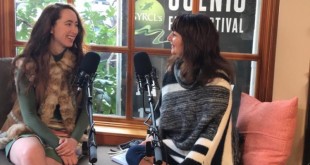During the 2007 COSCO Busan oil spill in San Francisco Bay, Nicole worked at the International Bird Rescue and Research Center cleaning and caring for oiled birds. This last May, after seeing and hearing about the Gulf oil spill disaster, Nicole knew she needed to take immediate personal action and put her experience and expertise to good use.
She traveled to Grand Isle, La., the frontlines of the Gulf oil spill to volunteer and document the stories that the rest of the world was not seeing or hearing. Her blog, The Recovery Room on Nature.com, takes readers into the heart of the oiled wildlife response effort to experience the animals, responders, residents and the environment during this man-made disaster in hopes that we can learn something.
How did you find your way down to the Gulf oil spill disaster?
“I heard about it on the news like everyone else and was in a state of shock. Then it went on for a couple of weeks and those weeks went by and I began trying to connect with volunteer organizations to see what I could do because I do. I had a really hard time connecting with anyone. Eventually I decided to go down there on my own without any affiliations to volunteer and to also cover the disaster as a journalist. I mounted a funding campaign with friends and family; sent out e-mails and started a blog to explain what I wanted to do, why I wanted to do it and my credentials.”
What did you find most shocking when you arrived in Grand Isle?
“The most shocking thing was the relief effort in general; the lack of use of qualified volunteers and relief workers. They have a lot of people there that are trying as hard as they can and they are doing the best they can, but they don’t have experience in this field. There is a whole army of people who do have experience and do want to help that they are not using. This is a very different kind of oil spill from anything we have ever seen, but at the same time there is somewhat of a precedent of the way a rescue and rehab operation works, but it’s just not happening.”
Why do you think that is?
“There is a lot of chaos in communications, but there are so many interests involved. Louisiana is a state entrenched in both the oil business and the fishing business so there is a huge duality of forces pushing in completely opposite directions.”
What are some of the long-term health effects of volunteering during an oil spill clean up?
“I have been doing quite a bit of research on this; there are medical studies that stem from the Exxon Valdez oil spill, which used one of the same dispersants they are using now, and the main ingredient of that dispersant has been linked to health problems. A shocking percentage of those volunteers from that spill are actually now deceased. It is a scary situation and even scarier because those chemicals are much more volatile in a hot climate like the South than they were in Valdez, Alaska.”
Can you speak to what are some of the discrepancies we are seeing in mainstream media versus what is actually happening on the ground?
“There are two kinds of media roadblocks in my opinion — actually being able to decode what is happening and the fact the media coverage has been very restricted. I found that while I was there, as a biologist approaching the spill, they don’t want people to have pictures of it and they are trying to downplay it as much as possible. The fewer animals that are recovered, the less BP or whoever is found liable for the destruction of the wildlife and an entire ecosystem, has to pay.”
We see images of oil soaked birds, turtles and fish in magazines and on the news, what about the ecosystems that we don’t see, the ones that are deep in the ocean?
“The larger implications of this oil spill are pretty scary because the dispersant has made the oil behave in a completely different way. It’s just not on the surface anymore; it is polluting the entire water column. The biggest problem for the ecosystem is the fact that the dispersants are very poisonous to begin with, and there are also poisons in crude oil and when they are mixed together their toxicity increases by an order of magnitude. The basis of the ecosystem is plankton or phytoplankton, they are actually going to be hurt the most by the presence of these tiny dispersed oil molecules. The plankton will either attach to the dispersants or eat it, then other things will eat them and then it will bioaccumulate as it moves up the food chain.”
In your experience with the COSCO Busan oil spill in San Francisco in 2007 and what is happening in the Gulf, how do the two relief efforts differ?
“Every oil spill is a giant fiasco, but the scale of this one is not comparable to anything else, so it is hard to compare what’s going on with this one to other oil spills, but at the same time you can compare the different organizational strategies they are using. During the COSCO Busan oil spill, the International Bird Rescue and Research Center (IBRRC) was largely in charge of the capturing and handling of the birds, and every aspect of oiled life rehab. In this spill, IBRRC individuals in Louisiana are not even allowed to capture birds there, the way that it is working is that anyone touching oiled wildlife has to be either a state or federal official.”
What should people know about what is happening down in the Gulf and how they can help?
“I think people should know that the wildlife rescue effort is largely failing and it’s very grim. People need to sleuth around, especially if they are Gulf Coast residents. They need to take it into their own hands and try to find their local wildlife rehab organizations and get them involved. Desperate times call for desperate measures.”
What is your message to women around the world?
“The opposite of an activist is an inactivist. Don’t let complacency run your life.”
See Jane Do is a multimedia program capturing the stories of everyday women doing extraordinary things for the planet. Catch the one-hour talk radio program on KVMR 89.5FM the first Wednesday of every month at 1 p.m.
Get involved !
5 things you can do today to make a difference with the Gulf oil spill disaster
- Support small conservation organizations working in the Gulf such as: Barataria-Terrebonne National Estuary Program: www.btnep.org/home.asp, American Birding Association: www.aba.org, On Wings of Care: www.onwingsofcare.org, Waterkeeper Alliance: www.waterkeeper.org , Barataria Chronicles: www.baratariachronicles.com, The Marine Environmental Research Institute: www.meriresearch.org
- Write to your state Senators and ask them to endorse the “Safe Dispersant Act.” It’s a piece of legislation introduced by New Jersey Senator Frank Lautenberg that will require that chemical dispersants used to break up oil after a spill be tested for their long-term effects on the environment and human www.contactingthecongress.org
- Make responsible choices. Petroleum products need to become a smaller part of our daily lives. We are all share the blame in this to some degree.
- Like Diane Wilson said, “Be an unreasonable person.” Being well behaved doesn’t seem to be getting enough done.
- Share information. The mass media is packing up and leaving the Gulf States. It’s up to the rest of us to tell the real story now.
 See Jane Do Everyday Women Doing Extraordinary Things
See Jane Do Everyday Women Doing Extraordinary Things
